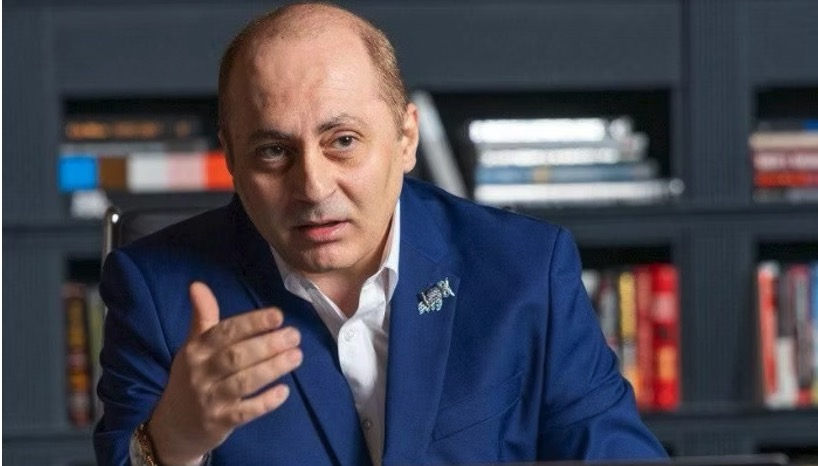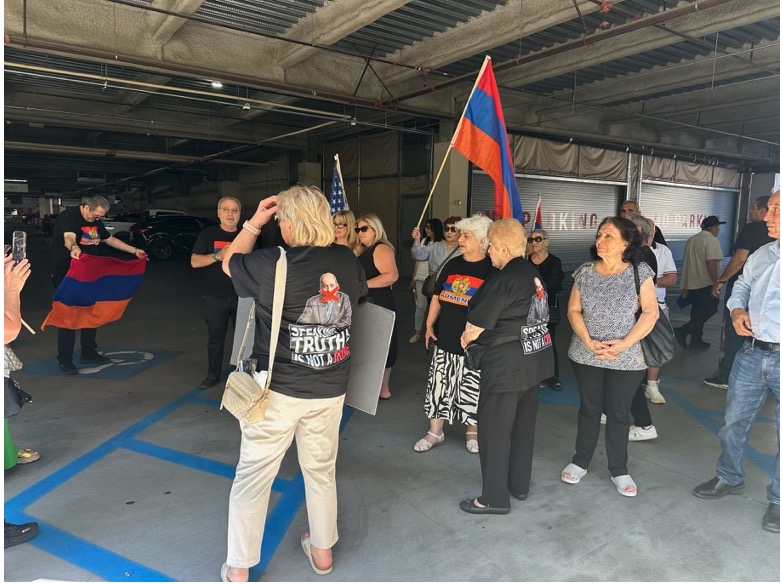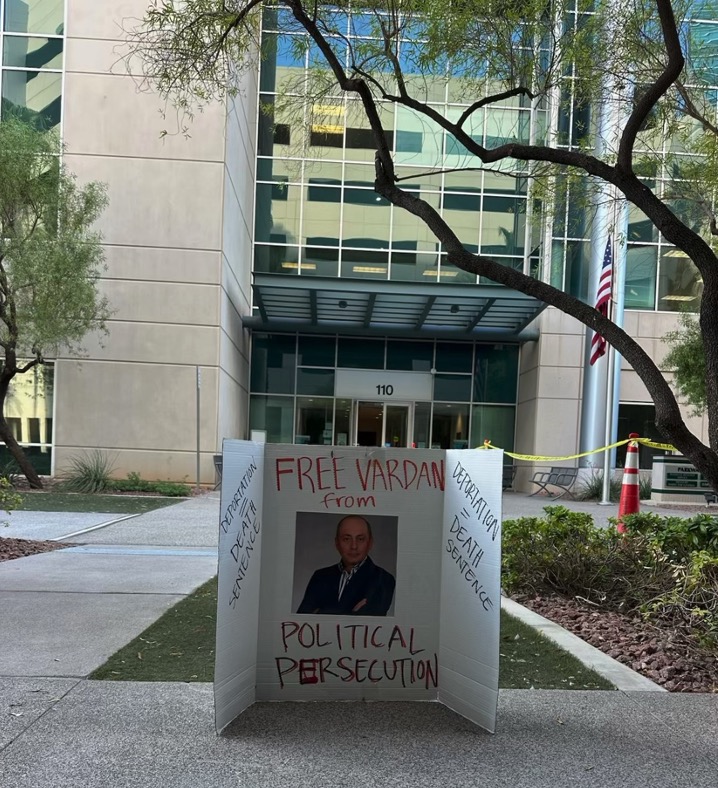Comments
GUEST WORDS - The ongoing detention of Vardan Gukasian, a former high-ranking officer in the Armenian Military Police and currently serving as the leader of the opposition party known as Democracy, Law and Order (D.O.K.), as well as a prominent government critique - in the Henderson Detention Center has triggered outcries from millions of supporters, human rights advocates, and observers of international law. Gukasian has been in custody of Henderson Detention Center since February 2025 under undisclosed charges, with both the circumstances and legal process shrouded in secrecy - echoing tactics commonly condemned in regimes criticized for lack of transparency and due process.

Vardan Gukasian - Leader of Armenian Opposition Party Democracy, Law and Order
Gukasian, who sought political asylum in the United States to escape relentless persecution by the regime of Armenian Prime Minister Serj Sargsyan, was taken into custody at his residence in Las Vegas under circumstances that warrant further scrutiny. He has had no immigration, residency, or any other legal issues, warrants, or criminal conduct. Throughout his time in the United States, Gukasian has consistently affirmed his commitment to maintaining the status of a law-abiding citizen who respects and follows the rule of law in every country, particularly in a nation that has openly extended protection and refuge to him. Despite extensive inquiries, the legal basis for his detention remains unclear, raising serious questions about potential underlying political motives and the extent of Armenian government influence and intervention in U.S. judicial processes. Concerns are further heightened by reports of manipulated facts and falsified court records – a notorious practice of the Armenian government.
A well-known and outspoken voice against Armenia’s persistent government corruption, financial malfeasance, and the misuse of both public and international funds, Gukasian’s activism included exposing the funneling of aid meant for disabled veterans and military personnel into private accounts tied to top officials and their families, massive public corruption, abuse of power, treason, unlawful detention, murder, and torture of political opponents, and more disturbing realities of the Armenian politics fueled by former Russian suppressive regime. These revelations, widely disseminated through his podcasts and remote appearances, made him both widely accepted by Armenian people all over the world and a target for retaliation by Armenian and Russian authorities and oligarchs. Allegations of fabricated criminal charges, including extortion and child molestation, have been widely contested by his supporters throughout the world, who maintain that Gukasian’s prosecution is politically motivated.
The legal team for Gukasian has faced criticism for a perceived lack of vigor in defending his rights. Despite seven court hearings as of August 2025, mountains of evidence in favor of Vardan Gukasian, the substance of the U.S. government’s case remains ambiguous, with reports of correspondence from Armenia intended to undermine his asylum claim through allegations that lack evidentiary foundation. Supporters worldwide have mobilized in protest, emphasizing the grave risks Gukasian would face if extradited or deported, including justifiable threats to his life and safety.
What is particularly alarming to legal experts is the manner and duration of his detention. Gukasian’s confinement, stretching over six months, in conditions described by his advocates and his legal team as tantamount to maximum security imprisonment, appears to contravene both U.S. constitutional protections and international human rights treaties. Restrictions include prolonged solitary housing with little or no outdoor access, deprivation of the right to a public hearing, and limited participation of legal counsel, all in ostensible violation of the International Covenant on Civil and Political Rights (ICCPR) and the Convention Against Torture.
Gukasian’s sudden and unsubstantiated detention is seen by supporters as irrefutable evidence that this entire campaign is orchestrated by the Sargsyan-Pashinyan regime, with strategic assistance from Russian oligarchs and the tacit approval - or at least complicity - of Azerbaijani and Turkish interests. As a fierce critique of public corruption, organized crime, and authoritarian practices not only in Armenia but also in Russia, Azerbaijan, and Turkey, Gukasian’s outspokenness has made him a target for all governments who fear his ascendancy as the next Armenian prime minister.

Las Vegas Immigration Court Parking Lot: Supporters are not allowed in the courtroom
Despite his detention, Vardan Gukasian’s popularity among Armenians has only grown, rapidly transforming him into a powerful symbol of hope and democratic renewal for the nation. From prison, Gukasian continues to inspire support across Armenia and among diaspora communities, with many believing that genuine freedom and democracy will not be possible in Armenia until he is released and able to participate fully in the country’s political life. The Armenian government, under Prime Minister Nikol Pashinyan, has taken extraordinary measures to prevent Gukasian and his opposition party from participating in elections - steps widely viewed as efforts to stifle true opposition and maintain a stranglehold on power. In fact, there are currently 2000 political prisoners in Armenian prisons merely for speaking up and political dissent.
Armenians worldwide see in Gukasian the last remaining hope that basic human rights and democratic values might eventually prevail in Armenia, and that decades of totalitarian rule and systemic corruption might finally be dismantled. Gukasian’s unyielding advocacy for free speech, anti-corruption efforts, and transparent governance has made him a beloved figure among ordinary Armenians - someone perceived as a “people’s leader” willing to sacrifice his own life for the future of his country.
Multiple legal precedents in the United States have held that administrative detention for immigration reasons must be reasonable and not indefinite; anything exceeding six months triggers constitutional scrutiny and, in many cases, judicial intervention. Nevertheless, Gukasian remains in detention without clear charges, and deprived of his supporters’ access to public hearings, raising concerns about the overreach and opacity of both U.S. and Armenian authorities in politically sensitive cases.
Civil society organizations, including the United Armenian Senate based in Berlin, the Armenian Apostolic Church, and millions of Gukasian’s supporters worldwide, have issued urgent appeals to international human rights organizations, the American judiciary, and the President of the United States, Donald Trump. These groups are calling for intervention, greater transparency, immediate due process protections, and the release of Mr. Gukasian pending a fair hearing, if substantiated. As emphasized by a spokesperson for a prominent human rights watchdog, “Detaining a political asylee without due process for such an extended period fundamentally contradicts the very principles of justice and liberty upon which the U.S. legal system is founded.”
Gukasian’s willingness to challenge an entire entrenched system - a system that now seeks to imprison him thousands of miles from home - underscores the lengths to which corrupt interests will go to silence opposition. His continued detention, viewed by many as the result of manipulated allegations and undue Armenian government influence over U.S. proceedings, has provoked widespread calls for justice and accountability. Supporters argue that no country truly respectful of the rule of law should allow a political asylee to be handed over to a corrupt regime merely for political expedience. The urgent demand is clear: justice for Gukasian means justice for Armenia’s future, and the world is watching to see whether democratic principles will prevail.

Las Vegas Immigration Court
Letters of support have been submitted to the federal judge through Gukasian’s legal team from a diverse array of voices worldwide, including church leaders, high-ranking officials, and prominent human rights organizations. These communications, alongside substantial evidence of Gukasian’s political activism and patriotism, strongly support his claim for political asylum. Yet, despite the overwhelming documentation, the court appears indifferent, seemingly turning a blind eye to the facts. The disregard of this evidence suggests a troubling alignment of interests influencing the U.S. justice system, raising serious concerns about impartiality in this politically charged case.
The case of Vardan Gukasian stands as a stark warning about the fragility of human rights when political motives can override core constitutional and humanitarian standards. The world is watching to see whether the U.S. justice system will reaffirm its commitment to the rule of law, or become complicit, knowingly or otherwise, in a transnational campaign of political retribution.
(Mariam M. is a dedicated community member and outspoken patriot, known for active engagement in local initiatives and public affairs. Deeply committed to the social and political advancement of her community, she regularly advocates for meaningful reforms and increased civic participation. Her efforts include organizing community events, participating in advocacy campaigns, and fostering collaboration among residents. Through consistent involvement, Mariam is recognized as a passionate voice for integrity, justice, and progress within the community.)
















